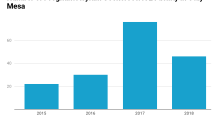
An asylum seeker from El Salvador says guards at the Immigration and Customs Enforcement (ICE)’s detention facility in Otay Mesa caused her to have a miscarriage after they ignored her repeated pleas for medical help in January 2018.
The allegations are detailed in a new lawsuit filed against the federal government and the private contractor CoreCivic which runs the detention facility in Otay Mesa.
Rubia Morales told immigration officials that she was pregnant while seeking asylum at the United States/Mexico Border in San Diego in December 2017. Despite this, Morales’ lawsuit claims guards inside the Otay Mesa immigration facility placed her in a “cold cell” without adequate food, or a blanket to stay warm, or the exercise needed for a pregnant woman.
Days later Morales said she began bleeding and cramping. She notified the guards but said they ignored her requests for medical attention. When a nurse for the facility responded to her cell, Morales said she did not conduct a physical exam but instead, only checked for a fetal heartbeat. The bleeding and cramping continued. Five days later she suffered a miscarriage after collapsing in line for food. She said nurses later told her that her baby may have been saved with proper medical care.
“It sickens me,” says Morales’ attorney Joy Bertrand. “This isn’t the country that I want greeting people showing up at our border at their most vulnerable.”
Bertrand says Morales is one of thousands of pregnant women detained in ICE detention facilities in the United States since 2017 when the Trump administration implemented a policy of imprisoning pregnant women whose pregnancies were in their first and second trimesters, a change from previous policy which prohibited such except in extreme cases or for those who pose serious security threats.
According to the Department of Homeland Security’s figures, obtained by NBC 7 Investigates through a Freedom of Information Act request, the number of pregnant women detained spiked at the Otay Mesa facility in 2017 after the policy change. Those numbers reveal that in 2015, the federal government detained 22 pregnant women for immigration violations or to await asylum hearings. In 2016, that number rose slightly to 30. But the following year, in 2017, when the new policy change occurred, the numbers spiked dramatically to 76 pregnant detainees. In 2018, the number fell slightly to 46.

The records do not show whether the pregnancy came to term or not for every detainee.
Local
“Ms. Morales is one of [the] thousands of people who have now fallen victim to these practices,” Bertrand told NBC 7 in a January 14 interview.
“Ms. Morales is not the only woman who has miscarried at that facility. It gets to a point where this is no longer simply an issue of incompetence.”
According to a report in the Arizona Republic, 28 women reported a miscarriage while in immigration custody during Fiscal Year 2017.
Medical experts believe holding pregnant women in custody could increase the chances of miscarriages.
“The facility would have to have regular prenatal care,” says licensed midwife Kayti Buehler.
“They would have to have a warm environment to stay in and sleep in so they’re not getting cold. Because when you get cold your body gets an excess of stress hormones which can actually cause a miscarriage.”
“A pregnant woman who bleeds for days needs to be seen,” added Buehler. “That’s a human right. I think that in an ICE detention facility, you could absolutely meet pregnant people’s needs. It’s important for their life, for the life of their baby, and if you ask me, the health of our country too.”
A spokesperson for CoreCivic told NBC 7 Investigates that it is the federal government’s responsibility to provide medical care to detainees.
As for claims that Morales and other pregnant mothers are not provided adequate meals, the spokesperson added that the company “provides three nutritious meals a day that members of staff also often eat. Additionally, CoreCivic takes great care to offer meals that support specialized diets and cultural preferences. Menus are reviewed and approved on a regular basis by a registered dietitian to ensure an appropriate diet is provided to those entrusted to our care.”
A spokesperson for U.S. Immigration and Customs Enforcement said the department “is committed to ensuring the health, safety, and welfare of all those in our care” and all women processed at their facilities are screened for pregnancy.
The spokesperson added, “In addition to pregnancy screenings at intake, all of the ICE detention facilities provide onsite prenatal care and education, as well as remote access to specialists for pregnant women who remain in custody.”



